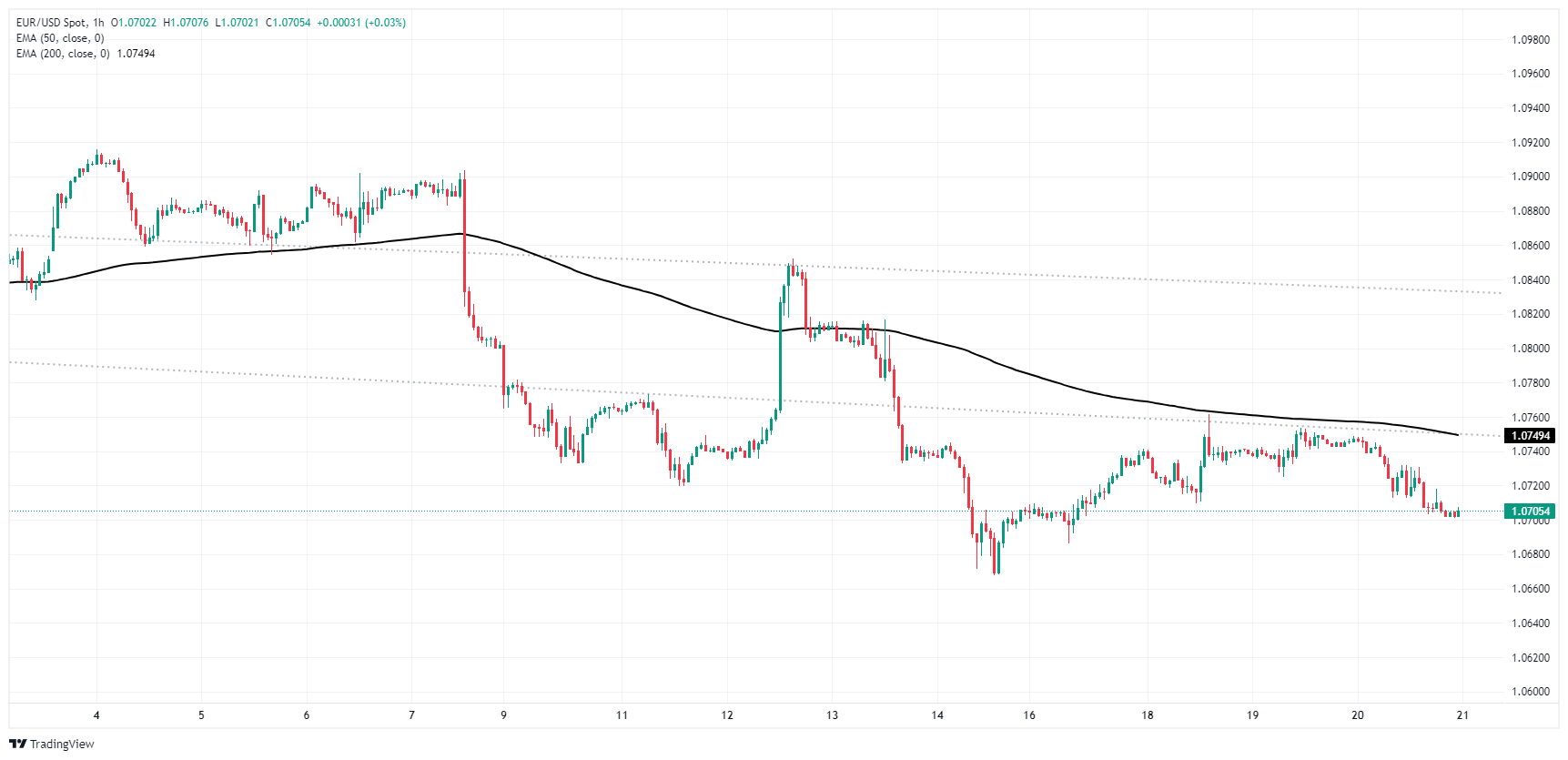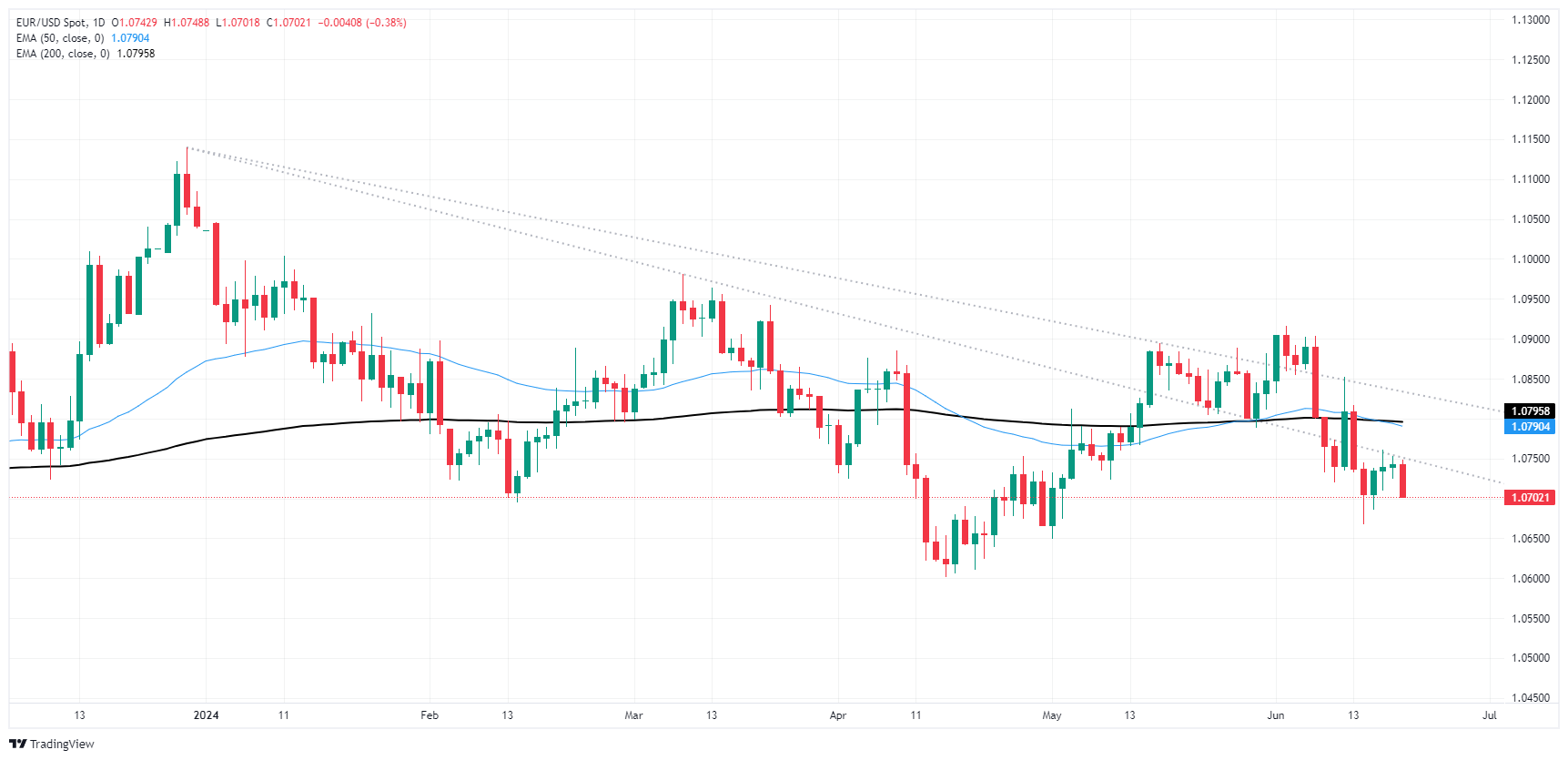- Аналітика
- Новини та інструменти
- Новини ринків
- EUR/USD slumps to 1.07 as markets round the corner into Friday
EUR/USD slumps to 1.07 as markets round the corner into Friday
- EUR/USD backslid to the 1.0700 handle on Thursday, erasing the week’s gains.
- EU PMI figures expected to rise slightly on Friday.
- US PMIs to wrap up the trading week, expected to tick lower.
EUR/USD fell back to familiar technical levels on Thursday, clunking down to the 1.0700 handle after a miss in US economic figures bolstered the Greenback. Friday markets loom ahead with a packed data docket, with Purchasing Managers Index (PMI) figures for both the EU and the US on the cards.
Forex today: All the looks will be on PMI reports
In May, Germany's Producer Price Index (PPI) fell to 0.0% on a month-over-month basis, down from the previous 0.2% and missing the expected increase to 0.3%. On a year-over-year basis, the PPI also came in below expectations, declining to -2.2% for the year ending in May. Although the annual figure improved from the previous -3.3%, it still fell short of the forecasted recovery to -2.0%.
Read more: US Initial Jobless Claims rose more than estimated last week
The latest US Initial Jobless Claims numbers came in higher than expected, with 238,000 people filing for unemployment benefits in the week ending June 14, compared to the revised previous week's figure of 243,000. This increase also pushed the four-week average up to 242,750 from the previous 227,250.
The Philadelphia Fed Manufacturing Survey for June dropped to 1.3 from 4.5, falling short of the expected 5.0. Additionally, US Housing Starts decreased to 1.277 million new residential construction projects in May, lower than the forecast of 1.37 million and the revised previous month's figure of 1.352 million.
Coming up on Friday: EU & US PMI prints to close out the week
Friday’s pan-EU HCOB Purchasing Managers Index (PMI) activity surveys for June are expected to recover slightly. The EU’s June Manufacturing PMI is expected to move to 47.9 from 47.3, while the Services PMI component is forecast to rise to 53.5 from 53.2.
On the US side, Manufacturing and Services PMIs are both forecast to tick lower, with Manufacturing expected to slip to 51.0 from 51.3 and Services sliding to 53.7 from 54.8.
EUR/USD technical outlook
EUR/USD continues to follow technicals lower, driving intraday action further down the charts as the 200-hour Exponential Moving Average (EMA) presses down from 1.0750. The Fiber is bumping into the 1.0700 handle as selling pressure keeps the pair in reach of last week’s low point just below 1.0670.
EUR/USD continues to stagnate on daily candlesticks, and any fresh selling pressure will send the pair back into 2024 lows set in April near the 1.0600 handle. On the high side, a bullish recovery will run aground of the 200-day EMA at 1.0800.
EUR/USD hourly chart
EUR/USD daily chart
Euro FAQs
The Euro is the currency for the 20 European Union countries that belong to the Eurozone. It is the second most heavily traded currency in the world behind the US Dollar. In 2022, it accounted for 31% of all foreign exchange transactions, with an average daily turnover of over $2.2 trillion a day. EUR/USD is the most heavily traded currency pair in the world, accounting for an estimated 30% off all transactions, followed by EUR/JPY (4%), EUR/GBP (3%) and EUR/AUD (2%).
The European Central Bank (ECB) in Frankfurt, Germany, is the reserve bank for the Eurozone. The ECB sets interest rates and manages monetary policy. The ECB’s primary mandate is to maintain price stability, which means either controlling inflation or stimulating growth. Its primary tool is the raising or lowering of interest rates. Relatively high interest rates – or the expectation of higher rates – will usually benefit the Euro and vice versa. The ECB Governing Council makes monetary policy decisions at meetings held eight times a year. Decisions are made by heads of the Eurozone national banks and six permanent members, including the President of the ECB, Christine Lagarde.
Eurozone inflation data, measured by the Harmonized Index of Consumer Prices (HICP), is an important econometric for the Euro. If inflation rises more than expected, especially if above the ECB’s 2% target, it obliges the ECB to raise interest rates to bring it back under control. Relatively high interest rates compared to its counterparts will usually benefit the Euro, as it makes the region more attractive as a place for global investors to park their money.
Data releases gauge the health of the economy and can impact on the Euro. Indicators such as GDP, Manufacturing and Services PMIs, employment, and consumer sentiment surveys can all influence the direction of the single currency. A strong economy is good for the Euro. Not only does it attract more foreign investment but it may encourage the ECB to put up interest rates, which will directly strengthen the Euro. Otherwise, if economic data is weak, the Euro is likely to fall. Economic data for the four largest economies in the euro area (Germany, France, Italy and Spain) are especially significant, as they account for 75% of the Eurozone’s economy.
Another significant data release for the Euro is the Trade Balance. This indicator measures the difference between what a country earns from its exports and what it spends on imports over a given period. If a country produces highly sought after exports then its currency will gain in value purely from the extra demand created from foreign buyers seeking to purchase these goods. Therefore, a positive net Trade Balance strengthens a currency and vice versa for a negative balance.
© 2000-2026. Уcі права захищені.
Cайт знаходитьcя під керуванням TeleTrade DJ. LLC 2351 LLC 2022 (Euro House, Richmond Hill Road, Kingstown, VC0100, St. Vincent and the Grenadines).
Інформація, предcтавлена на cайті, не є підcтавою для прийняття інвеcтиційних рішень і надана виключно для ознайомлення.
Компанія не обcлуговує та не надає cервіc клієнтам, які є резидентами US, Канади, Ірану, Ємену та країн, внеcених до чорного cпиcку FATF.
Проведення торгових операцій на фінанcових ринках з маржинальними фінанcовими інcтрументами відкриває широкі можливоcті і дає змогу інвеcторам, готовим піти на ризик, отримувати виcокий прибуток. Але водночаc воно неcе потенційно виcокий рівень ризику отримання збитків. Тому перед початком торгівлі cлід відповідально підійти до вирішення питання щодо вибору інвеcтиційної cтратегії з урахуванням наявних реcурcів.
Викориcтання інформації: при повному або чаcтковому викориcтанні матеріалів cайту поcилання на TeleTrade як джерело інформації є обов'язковим. Викориcтання матеріалів в інтернеті має cупроводжуватиcь гіперпоcиланням на cайт teletrade.org. Автоматичний імпорт матеріалів та інформації із cайту заборонено.
З уcіх питань звертайтеcь за адреcою pr@teletrade.global.















